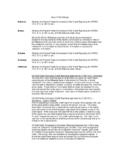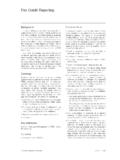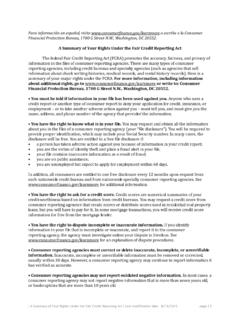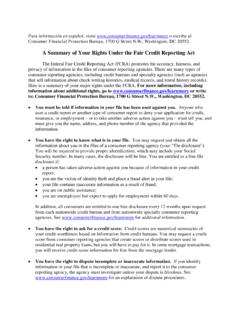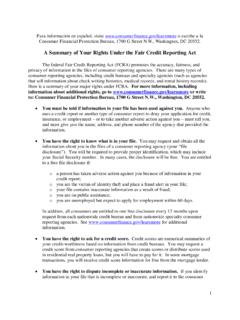Transcription of Facts on FACTA, the Fair and Accurate Credit …
1 6/6/08 10:09 AMFacts on FACTA, the fair and Accurate Credit transactions ActPage 1 of 16 #2a Fact Sheet 6(a): Facts on FACTAC opyright 2004-2007. Privacy Rights Clearinghouse / UCANP osted August 2004. Updated June 2006. Search Our a Question? : HOMEFACTA, The fair and Accurate Credit transactions Act:Consumers Win Some, Lose for Identity Theft Victims A. Free Credit Reports B. Fraud Alerts and Active Duty Alerts C. Truncation: Credit Cards, Debit Cards, Social Security Numbers D. Information Available to Victims E. Collection Agencies F. Red Flags G. Disposal of Consumer of Consumer Inaccurate Information in a Consumer Information and Consumer Specialty Consumer Reporting Sharing Among Affiliates Opt-Out for IntroductionThe fair and Accurate Credit Transaction Act of 2003 (FACTA) added new sections to thefederal fair Credit Reporting Act (FCRA, 15 1681 et seq.), intended primarily to helpconsumers fight the growing crime of identity theft.
2 Accuracy, privacy, limits on informationsharing, and new consumer rights to disclosure are included in FACTA. (Pub. L. 108-159, 111 Stat. 1952)This is all good news for consumers. However, consumers came out on the losing end whenCongress virtually barred states from adopting stronger laws. The Notes section at the end ofthis guide has more information about Congressional pre-emption of state this guide we use the terms law and regulations or rules when referring to new6/6/08 10:09 AMFacts on FACTA, the fair and Accurate Credit transactions ActPage 2 of 16 #2aconsumer rights under FACTA. For consumers trying to understand the process, this can beconfusing. To simplify, a bill introduced in Congress becomes law after it is approved by both theHouse of Representatives and the Senate and then signed by the law often directs the appropriate federal agency or agencies to adopt regulations, or rules,that expand upon the provisions included in the law.
3 In most cases, federal agencies publishproposed regulations seeking public comment. Industry representatives, private citizens, othergovernment agencies, consumer organizations, and anyone else with an interest can submitwritten comments to the agency. After the comment period is completed and the agency hasanalyzed all the comments, it then issues the final rules. Properly adopted rules have the sameeffect as a law passed by new sections of FACTA were effective December 1, 2004. Other sections directed federalagencies to solicit public comment and then adopt final regulations. In addition to the FederalTrade Commission ( ), the federal financial agencies have jurisdiction and areinvolved in writing regulations to implement year later, the rule writing is not finished. Although some rules are now final, otherproposed rules have been published for public comment but not yet finalized. And as of thiswriting, some very important consumer protection rules like the red flag guidelines have not yetbeen released for public guide is a summary and update of the new FACTA provisions.
4 Information about therulemaking process is in the References section at the end of this guide. There are still manydetails to be decided through regulations. We will continue to revise and update these sectionsas final federal regulations are published. For more about the FACTA rulemaking process, seethe Resources section at the end of this Help for Identity Theft VictimsThe crime of identity theft has continued at epidemic proportions. Several widely reportedsurveys on the number of identity theft victims were released as Congress went into finalhearings on FCRA amendments. A shocking report released by the Federal Trade Commissionin September 2003 estimated that approximately 10 million people were victims of identity theftin 2002 alone. To read the FTC's analysis and other surveys on identity theft, visit the PRC webpage, How Many Identity Theft Victims Are There?, response to new findings about identity theft, Congress adopted a number of provisionsaimed at prevention and help for victims.
5 The FTC recently published a revised guide for identitytheft victims which includes new FACTA provisions. Take Charge: Fighting Back Against IdentityTheft can be found at Free ReportsConsumer advocates have long encouraged individuals to monitor their Credit reports as a wayto detect identity theft. The standard advice was to request a copy of your Credit report once ayear from each of the three national Credit bureaus: Experian, TransUnion, and Equifax. Untilnow, you usually had to pay up to $ to get a copy of your report from each of these recognized the benefits of self-monitoring. It adopted a new rule that allows you a freecopy of your Credit report annually from each of the big three. (Read more about therulemaking on this provision.)Should I contact each Credit bureau for my free report?6/6/08 10:09 AMFacts on FACTA, the fair and Accurate Credit transactions ActPage 3 of 16 #2aNo. The only way to get your free reports is through a centralized source, a combined effort bythe three national bureaus.
6 Free reports are available through a dedicated web site, You may order by telephone at ( 877) 322-8228 or by mail. For acopy of the mail-in form, go to is the best way to order my free reports?We recommend you order free reports by telephone or mail. A World Privacy Forum reportreleased in July 2005 exposed hundreds of imposter web sites. To read the full report and tipsfor ordering free reports, see FTC filed suit against one imposter site and sent warning letters to many others. Somebogus sites lure you in with free offers, but just want to sell you products like Credit monitoringservices. Others are outright frauds that aim to steal your personal information. To read moreabout fake sites, see you still prefer to order your free reports online, make sure you link to the only official web safest way to do this is through the FTC's web site which includes more information onannual reports. Never visit a site youfind through a search for terms like free Credit reports, free Credit scores, or free creditchecks.
7 Am I still entitled to a free Credit report if I am unemployed?Yes, and for other reasons as well. You can still get a free copy of your Credit report if youcertify to the Credit reporting agency that:You are unemployed and intend to apply for employment in the 60-day periodbeginning on the date you make the you receive public welfare you believe your file contains inaccurate information due to also gives you new rights to a free Credit report if you are a victim of identity theft. Formore on this, see Section 2B below on fraud and active duty addition to free Credit reports, FACTA gives you the right to one free report annually from aconsumer reporting agency that compiles reports on employment, medical records, checkwriting, insurance, and housing rental history. For more on what FACTA calls nationwidespecialty consumer reporting agencies, see Section 8 below and PRC Fact Sheet 6b, The Other' Consumer Reports: What You Should Know About Specialty Reports, live in one of the states that passed a law prior to FACTA giving residents free I order an additional free Credit report under my state's law?
8 Yes. The seven states that have laws on the books giving their residents a free Credit reportannually are: Colorado, Georgia (two per year), Maine, Maryland, Massachusetts, New Jersey,and Vermont. If you live in one of these states, you can obtain a free report from each bureauannually under federal law and an additional free report under your state's Fraud Alerts and Active Duty AlertsIf you are the victim of identity theft, FACTA gives you the right to contact a Credit reportingagency to flag your account. To place a fraud alert, you must provide proof of your identity to thecredit bureau. The fraud alert is initially effective for 90 days, but may be extended at your6/6/08 10:09 AMFacts on FACTA, the fair and Accurate Credit transactions ActPage 4 of 16 #2arequest for seven years when you provide a police report to the Credit bureaus that indicates youare a victim of identity creates a new kind of alert, an active duty alert, that allows active duty military personnelto place a notation on their Credit report as a way to alert potential creditors to possible on duty outside the country, military members are particularly vulnerable to identity theftand lack the means to monitor Credit activity.
9 An active duty alert is maintained in the file for atleast 12 a fraud alert or active duty alert is placed on your Credit report, any business that is asked toextend Credit to you must contact you at a telephone number you provide or take other reasonable steps to see that the Credit application was not made by an identity gives you the right to a free copy of your Credit report when you place a fraud alert. Withthe extended alert (seven years), you are entitled to two free copies of your report during the 12-month period after you place the FACTA provisions also allow you to block certain items on your Credit report that resultedfrom identity theft. Like the fraud alert, blocking was already an option for consumers in somestates. With FACTA, Congress has made blocking the national standard.(Read more about the rulemaking on this provision.)C. Truncation: Credit Cards, Debit Cards, Social Security NumbersCredit card receipts that include full account numbers and expiration dates are a gold mine foridentity thieves.
10 In some states, printing of the full account number is already prohibited. For thefuture, FACTA sets a national standard requiring truncation of Credit card says Credit and debit card receipts may not include more than the last five digits of thecard number. Nor may the card's expiration date be printed on the cardholder's ,the effective date of this provision is a long way off, and there are a couple of loopholes:This section does not apply to receipts for which the sole means of recording acredit or debt card number is by handwriting or by an imprint or copy of the machines in use before January 1, 2005, the merchant has three (3) years machines in use after January 1, 2005, the merchant has one (1) year FACTA section allows consumers who request a copy of their file to also request thatthe first 5 digits of their Social Security number (or similar identification number) not be includedin the Information Available to VictimsFor victims, obtaining copies of the imposter's account application and transactions is animportant step toward regaining financial health.
